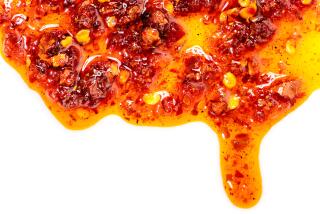Your Money : Some Food Names Already Changed
- Share via
Though Congress may act to delay until August the enforcement of new federal food labeling rules, some big brands have already changed names.
Among those affected are potato chips, hot dogs and cheese brands with too much fat to call themselves “light.” The new rules define a light product as having half the fat of the regular version. The rules took effect May 8, but Congress may suspend them for a few months to give food manufacturers time to use up old labels.
Relying on feedback from surveys and focus groups, Procter & Gamble has changed the name of one line of its potato chips to Pringles Right from Pringles Light. Frito Lay has changed the name of Ruffles Lite chips to Ruffles Choice. The companies say these names suggest consumers are buying the right product and making good choices.
Other companies have taken a less-imaginative approach. Kraft has dropped the Light Naturals name from its cheese in favor of the description “one-third less fat.” Similarly, Hebrew National Lite beef frankfurters are now “reduced-fat” frankfurters.
“We decided to call it what it is,” said Martin Silver, vice president of Hebrew National Foods. “We didn’t want to make up a cutesy name. It would have meant trying to explain in our advertising what the name meant.”
The straightforward approach is not without problems, as it links the word fat, albeit reduced-fat, to the brand name. Silver says Hebrew National is concerned about how consumers will react.
“In today’s vocabulary, fat is a negative word,” he said.
*
Pointing the way: Under pressure from other cards offering rewards, AT&T; Universal Card is awarding consumers one bonus point for every dollar they charge. Consumers accumulating enough points can exchange them for airline tickets, discounts on new Hondas and other merchandise.
The incentive is a direct challenge to the highly successful GM Card, which offers consumers discounts on new General Motors cars, among other things. On Thursday, Chase Manhattan Bank announced a reward program that returns to cardholders 1% of purchases over $200 and also offers them a rebate on finance charges.
William O. Adcock, chairman of Synergistics Research Corp., an Atlanta-based consulting firm, said other large credit card companies are likely to follow with reward programs.
“The question is not whether, but when,” he said.
Over the last several years, many credit card issuers have lowered their rates and reduced or eliminated annual fees, imitating the strategy that made AT&T; Universal Card successful. These days, Adcock said, it takes more than simple price cuts to attract consumers.
AT&T; has designed the point system to encourage users to carry monthly balances, an important source of revenue for card companies but one that has not been as lucrative as it might be for AT&T.; About two-thirds of all credit card users carry balances, but the figure is lower at AT&T; because, analysts say, consumers tend to use it as their second card.
By rewarding consumers with points on their balances, as well as on their new purchases, AT&T; is trying to change the way some consumers use the card.
The points program is also designed to give the long-distance side of AT&T; a boost. The points are easily redeemed for free telephone calls on AT&T;, giving consumers an incentive to use the company.
It’s not clear whether consumers should change their credit habits just to earn points, however. Consider the example on AT&T;’s promotional mailer sent to consumers this week. It says people who carry monthly balances of $1,700 will earn enough points in one year to receive five hours in long-distance calls.
At current rates, you’ll pay more than $260 a year in interest. By comparison, it costs $81 for five hours of daytime calls between Los Angeles and Manhattan.
*
Check fees: A consumer group on Thursday reported a sharp increase in the number of banks charging fees to people who deposit someone else’s bounced check.
The California Public Interest Research Group said 85% of 295 banks surveyed nationwide charge the so-called “deposit item returned” fee, up from 35% three years ago. California banks surveyed charged an average DIR fee of $4.53, below the national average of $5.29. New York banks had the highest average fee, at $8.55.
CalPIRG argues that the fee should be eliminated because banks already more than cover their expenses by charging “not sufficient funds” fees to the people who bounce the checks. “The people receiving these checks shouldn’t pay for the mistakes of others,” said Ed Mierzwinski, CalPIRG program director.
A representative of the American Bankers Assn. said the fees encourage check recipients to scrutinize check-writers’ identification.
More to Read
Inside the business of entertainment
The Wide Shot brings you news, analysis and insights on everything from streaming wars to production — and what it all means for the future.
You may occasionally receive promotional content from the Los Angeles Times.










